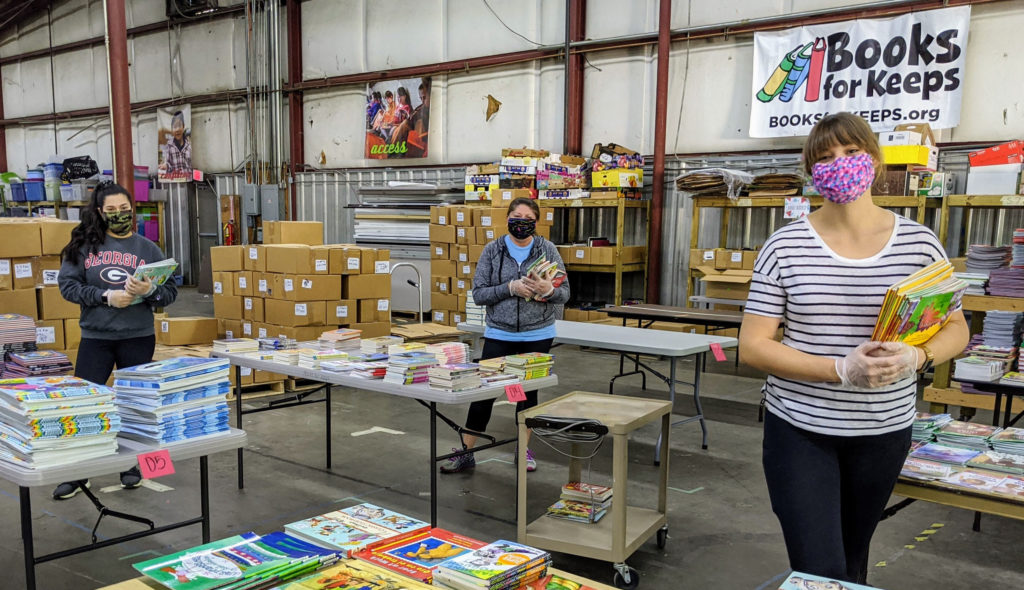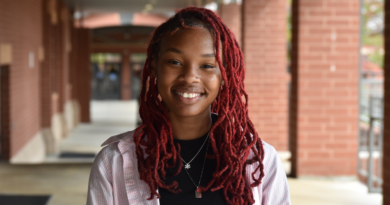Local non-profit keeps books accessible during the pandemic
When schools in Clarke County shut down due to the COVID-19 pandemic, so did access to physical books. All public and county libraries were closed by March 16, with reopening dates getting set back further and further as each week dragged on. Neglecting reading has a particularly negative impact on school-age children, many of whom receive their reading materials from the local nonprofit Books for Keeps.
Executive Director Leslie Hale said that the organization had to act fast during the beginning stage of the pandemic.
“We had to turn on a dime. We had to build this e-commerce website for students to shop their books, which was a huge accomplishment, but that wasn’t ready to roll out to families until the final two weeks of the school year,” Hale said.
The organization would normally be organizing its end-of-year book drops at Clarke County schools in the spring, but Books for Keeps had to find new ways to distribute 12 books to every elementary school student.
“Students were shopping for books with the help of a family member, sometimes with the help of a teacher, and we were packing their orders. Then with the help of volunteers, we delivered books to students’ homes from May into the first week of August. We delivered 68,000 books to students’ homes, primarily with the help of volunteers,” Hale said.

One of the organization’s leading concerns right now is combating the ‘COVID slide,’ a phrase derived from the term ‘summer slide,’ highlighting the academic decline students can experience when they are out of school for an extended amount of time.
“One reason that we are particularly concerned as an organization and should be as a community is that researchers are looking at the extended amount of time that children have been out of school in 2020, and in some cases, students who are still out of school right now, trying to live remotely. They’re referring to it as ‘COVID slide’ thinking that it is really going to be an extended, almost magnified impact that we see just during summertime,” Hale said.
A recent study by Dr. Kuhfeld and Dr. Tarasawa from Northwest Evaluation Associates shows that Hale’s concern is not an overaction. The study found that COVID slide would cause students to likely return to school in the fall of 2020 with about 70% of the reading gains compared to a normal school year.
While this data is significant, it does not include the potential impact that sustained online learning could have on learning losses.
Books for Keeps works to combat the potential losses of online learning through delivering books. In May Books for Keeps had to continue to use their resources in the Athens community to help carry out their mission.
“(In) the process of reaching those families to say, ‘Hey, your students can still get Books for Keeps books with a link and you can order their books,’ a lot of families weren’t even seeing those messages. So it took a lot of work, especially on the part of media specialists and teachers at the schools,” Hale said.
Whit Davis Elementary media specialist Lauren Knowlton encouraged her students to take advantage of resources such as curbside pickup and numerous e-reading apps such as Capstone ebooks. Knowlton utilized Books for Keeps as well, guaranteeing all of her students received the books they wanted.
“We made sure just about everyone put in an order. If they didn’t put in an order for themselves for their books, myself and their homeroom teachers put in orders to make sure that they got their 12 books,” Knowlton said.
Books for Keeps also worked with partners such as Family Connection who delivered books to children who had not filled out the form.
“They were able to reach several hundred more families, just going into those communities doing some door-to-door work. We worked with the Athens homeless shelter, and they were able to make sure that they (students) got books. We worked (with) the Boys and Girls Club and the YMCA, which both had summer camps to reach some of their campers who hadn’t ordered books,” Hale said.
While other online e-book resources are available for Clarke County students, Hale emphasizes the importance of physical books and their effect on the long term future.
“Books have this really unique ability to pull us in, to keep our attention, and keep our focus, and as a result, reading the written word on a page on paper, can actually engage the parts of the brain that are associated with building empathy,” Hale said.
Hale also pointed out how easy it is for students to get distracted when a book is in digital format.
“We are more likely to be distracted by other things on the screen. You know, should I click on this link? Should I navigate to this other thing? Should I go cruise YouTube for a couple of minutes,” Hale said.

Knowlton is grateful for all the community resources that played a role in giving kids book access in the summer and continuing into the fall.
“There (were) a lot of things that came into play with our community organizations —the public library, Books for Keeps, and all the different free e-book resources that kind of help. Myself and my fellow teachers feel like okay, they have some really good resources here, even if we’re not able to (offer) traditional library services,” Knowlton said.




